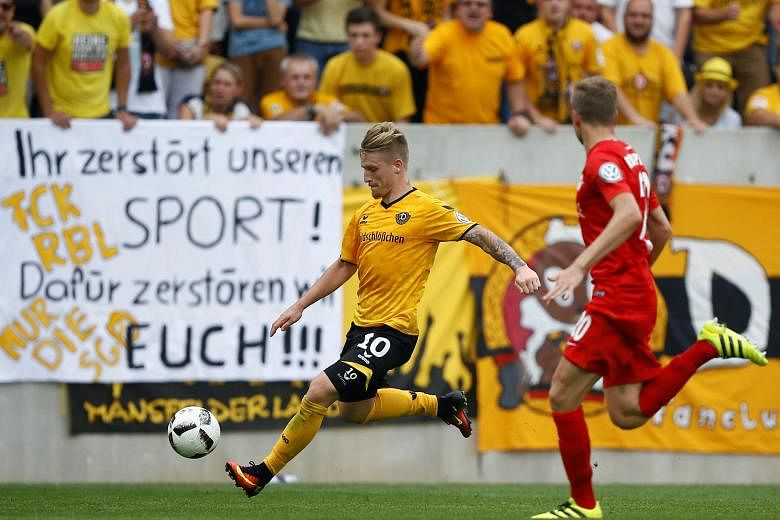BERLIN • The promotion of RB Leipzig to the Bundesliga has caused resentment among hardcore fans of traditional teams, sparking fears that "plastic clubs" could ruin the traditional culture in Germany's top flight.
Leipzig are backed by Austrian energy-drinks giant Red Bull, which took over a football licence and founded the club in 2009.
The team was renamed RasenBallsport Leipzig, specifically to get around the German league rule forbidding teams from carrying a sponsor's name.
Four promotions in seven years have taken Leipzig to the Bundesliga and their young squad are unbeaten after six games in their first season in the top tier.
But their impressive performances have earned little respect from Germany's hardcore fans - labelled "Ultras".
Some Leipzig matches have been boycotted and a severed bull's head was even thrown onto the playing area for an away German Cup match.
"Red Bull Leipzig is leading the whole system of football to ad absurdum," filmmaker and Dortmund fan Jan-Henrik Gruszecki told broadcaster Sport1.
"Traditional clubs like Dortmund, Schalke, Cologne and Bayern Munich want to make money and play football. Red Bull want to sell a product and a brand. This is the basic difference."
Hostility towards sponsored teams in Germany's top flight is nothing new, but Leipzig have crystallised growing resentments.
Ingolstadt, Bayer Leverkusen, Wolfsburg, Hoffenheim and now Leipzig are all backed by wealthy companies or individuals.
Germany has a 50+1 rule that prevents individuals or institutions owning clubs outright and also states that a club must hold a majority of its own voting rights.
But Leipzig bypassed the rule with 51 per cent of the club owned by Red Bull employees - and the other 49 per cent is owned by Red Bull.
"The peculiarity of the culture of football in Germany is that the clubs were founded as an association, in which the supporters have control of power and decision-making," Jonas Gabler, an expert on football culture in Germany, said.
"Now fans have the impression that this tradition is perverted by clubs who are created by companies."
Fans of traditional teams criticise plastic clubs for relying on a sponsor, who can withdraw the cash at will, and for taking the place in the top flight of a less wealthy club.
For example, Leipzig beat Nuremberg, who have a strong tradition in Germany's top flight, to an automatic promotion spot last season.
Reasonable ticket prices are a feature of German club football, but fans fear a deterioration of the mutual respect between clubs and their supporters could lead to a rise in prices.
AGENCE FRANCE-PRESSE

